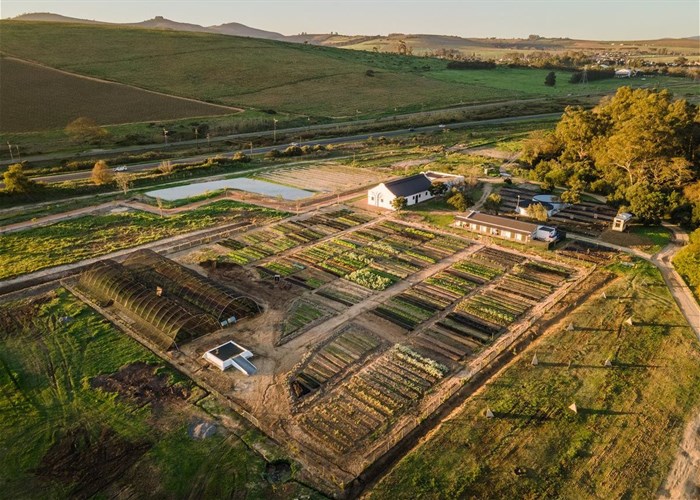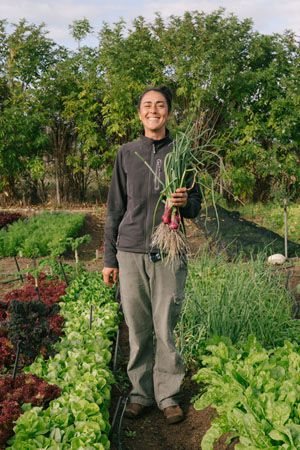
Related
Top stories

Marketing & MediaWarner Bros. was “nice to have” but not at any price, says Netflix
Karabo Ledwaba 8 hours




Logistics & TransportMaersk reroutes sailings around Africa amid Red Sea constraints
Louise Rasmussen 51 minutes

More news



















After months of toiling behind the scenes, Spier Food Garden's agroecologist, Megan McCarthy and her team are excited to welcome visitors into this tranquil space.
We chat with McCarthy about these techniques, soil health and what we can expect from the wine farm next.
The family who owns Spier always dreamt of making food production more accessible to the public visiting the farm. They envisioned a space where parents and children could ramble, harvest their own produce, and be inspired to begin growing their own nutritionally dense food at home. In 2019, the family approached me to assist in making their dream materialise.
Regenerative farming goes beyond sustainability. It means leaving the space in a better state than how you found it, as opposed to simply maintaining the status quo. The high number of diverse crops and indigenous plants in and around the garden means that should we ever walk away from the space, nature would comfortably return through the pioneering, soil-restorative practices that have already been put in place.

Soil carbon levels have been improved, leading to higher humic and fulvic acid levels. This means beneficial soil fungi and bacteria are present in abundance, releasing all the minerals required for healthy plant growth and good pest resistance. Earthworms have returned, assisting in developing a soft food and moist sponge underground, enabling plants to last longer without irrigating or feeding.
Flowering species and safe habitats have lured beneficial creatures back, assisting us immensely in managing their natural prey that normally cause crop damage. It’s all about learning from and mimicking the best teacher in the world – Mother Nature herself.
Healthy soils = healthy plants = healthy people.
Soils that are high in certain nutrients improve plant “sugars” – making plants less prone to insect pressure and pest attacks. By improving our soils, we have dramatically reduced the need to spray organic treatments, letting nature take its course. Farming starts from the soil up.
• A healthy working environment and surplus to share with employees, their families and local communities ensure that the Food Garden team i
s strong and happy.
• Our patrons supporting the Spier Farm Café, online shop or restaurants are guaranteed of the freshest organically grown produce around! Nothing beats the taste of organically grown vegetables, which has been proven to be higher in vitamins and minerals compared with their conventional counterparts. All of our produce is packed in compostable biodegradable packaging.
• Planting within the rhythms of the seasons means our chefs have to stay creative as produce selections change at least four times a year. Menus change often, meaning wine pairings have to change regularly too. It has been very exciting collaborating with chefs and winemakers when planning events and menus, especially around our organically certified wines.
• Self-harvesting on Saturdays – you can book on our Food Garden page.
• Cut flowers, basil, tomato, pumpkin, squash, butternut, brinjal, hopefully some watermelon, beans, great salad leaves, our famous rainbow carrots, beet, radish, swiss chard, mielies, kale and chilli.
• We will also be planting small protea and rose gardens to supply cut flowers.

• Don’t rush. Take a full year to observe your space carefully before designing it.
• Don’t be sentimental. If things don’t work the first time, learn from your mistakes and try something new.
• Ask for advice. Don’t reinvent the wheel. There are incredible organic producers in South Africa. We are part of the Western Cape Farmers Participatory Guarantee System (WCFPGS), a great platform to learn.
• Don’t expect it to be a profitable exercise in the first few years. You need to get your soils amended and find your groove organically. Rather view the organic spaces as a way to give back to your community, visitors and Mother Nature.
• Most of the team that joined me at the start of lockdown were employed on a short-term contract. The idea was to develop a skill set so that this knowledge would return to the communities and ensure long-term food security.
The food produced during hard lockdown also went straight to community food schemes, and provided plant material such as fruit trees, seedlings, and seeds for families already growing their own food. Gratefully, most of the team have been retained permanently as our production expanded.
• We work closely with The Sustainability Institute, which has been incredible with regards to community support and skills development in the Lynedoch district, sharing time and other resources where and when needed. Where possible, The Spier Food Garden also shares surplus produce and growing supplies with other community food growing endeavours in many areas of South Africa.
• The Spier Food Garden hosts regular workshops and tours to share food production knowledge. As the great Bill Mollison once said, “The greatest change we need to make is from consumption to production, even if on a small scale, in our own gardens. If only 10% of us do this, there is enough for everyone.
The garden’s nutrient-rich produce is used in Spier’s restaurants and can be purchased online and from the Spier Farm Café. Visitors are now also able to harvest their own directly from the garden for R150, take home a box full of seasonal vegetables.
Self-Harvest Saturdays run from 09.00 to 11.00 every Saturday morning. Advanced booking is essential.